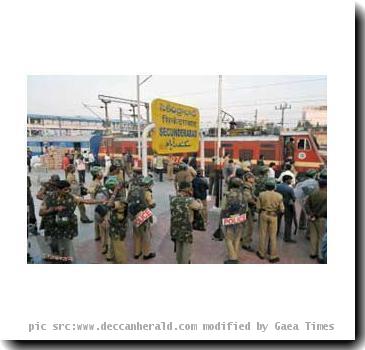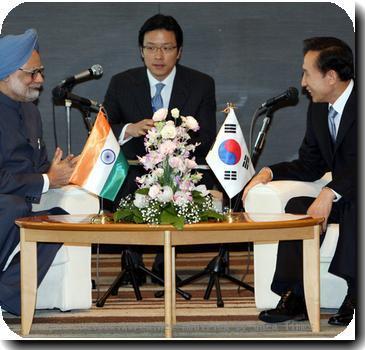A hot-and-cold recipe for Kashmir (Comment)
By Amulya Ganguli, IANSFriday, September 17, 2010
Before Rahul Gandhi threw a lifeline to Omar Abdullah by saying that the Kashmir chief minister needs time and support to defuse the volatile situation in the valley, the latter may well have been on his way out.
Among those who were seemingly gunning for him by underlining the so-called governance-deficit in the state was the Majlis-e-Ittehadul Muslimeen chief Asaduddin Owaisi while Janata Dal-United’s (JD-U) Sharad Yadav wondered how Omar could have frittered away his goodwill so quickly.
However, if the major parties refrained from personalising the issue at last Wednesday’s all-party meeting in New Delhi, the reason was that blaming the young chief minister would have been the easy way out. The real problem lay in the failure of the three parties which have ruled Kashmir in turns and also as partners - the Congress, the National Conference (NC) and the People’s Democratic Party (PDP) - to expand their political bases and thereby restrict the influence of the separatists.
The explanation for this lapse lies in the familiar cynicism of all major parties (which is in evidence in relation to the insurgents in the northeast as well) in refusing to be forthright in their condemnation of the separatists when they are out of power. There is little doubt that this disinclination is the result of the fear that such a stance will boost the position of the ruling parties.
Yet, in a situation fraught with “anger and pain” among youth, which Congress president Sonia Gandhi referred to in her speech at the all-party meeting, the objective of all the major parties in the state, which have a stake in its stability, should be to speak with one voice against the secessionists. Otherwise, it is the latter who will exploit the local grievances and create havoc, as they have been doing over the past few months, because their sole intention is to add fuel to the fire.
It is only now when the conditions have become explosive that the two ruling parties of the state and the PDP, the principal opposition party, have got together to suggest a course of action. But it wasn’t long ago that the PDP had ignored Prime Minister Manmohan Singh’s appeal to it to join an all-party meeting called by Omar Abdullah in Srinagar. It is this unfortunate tendency to use the troubled situation to undercut a political opponent which can boost the separatists.
Related to these tactics (which are all right in normal conditions but not when the insurgents are running amok) is the tendency to appear soft on the militants. This penchant to call them “our boys” can also be seen in the context of the anti-Maoist operations elsewhere in India, but it is in reality only a half-truth.
What this display of softness motivated by the wish to utilise their services in political campaigns later overlooks is that these young men and women are engaged in an anarchic uprising to dislodge a popularly-elected government. Since the purport of this rebellion is vitiated by Pakistan’s backing in Kashmir, it cannot be disregarded as the acts of misguided youths.
At the same time, PDP leader Mehbooba Mufti had a point when she asked why these boys should be “fired upon”. If the state government as well as the centre has contributed to the “anger and pain” in Kashmir, it is by using antiquated, colonial-style crowd control measures in an insensitive recourse to brute state power.
There could hardly be any justification for firing on the stone-pelters in Srinagar and elsewhere when water cannons and rubber bullets would have gone a long way to drive them away. But deaths from firing and also from teargas shells, which killed a 17-year-old passer-by last June, could only aggravate the situation. Instead of talking about diluting the Armed Forces (Special Powers) Act (AFSPA), union Home Minister P. Chidambaram would have been well advised to focus more on using humane measures to disperse unruly mobs.
In the event, it is not surprising that the all-party meeting could not reach a consensus on the AFSPA. It is also clear that the Act cannot be modified or withdrawn from a few areas at present because the decision will only boost the morale of the insurrectionists and further undermine the state government’s credibility. If any changes are to be made in a piece of legislation which is regarded as draconian, it should be done in normal times and not in an incendiary situation lest it be seen as a loss of nerve on the government’s part.
If any harshness is to be shown against the rebels, it should be directed at their ring leaders like Syed Ali Geelani, pro-Pakistani hawk Asiya Andrabi, the woman jehadi who breathes fire from behind her all-encompassing veil, and Masarat Alam Bhat, a relative newcomer on the militant circuit. Their prolonged incarceration along with an unrelenting crackdown on their agents and the inflammable CDs and audio-cassettes smuggled in from Pakistan have to be one of the state government’s priorities.
It should not be forgotten, however, that creating employment opportunities for the disaffected youth is the long-term solution. But in the immediate future, a hot-and-cold approach - directing the heat on the hardliners and cold showers from water cannons for the stone-pelters - is likely to yield better results.
(18.09.2010-Amulya Ganguli is a political analyst. He can be reached at aganguli@mail.com)

